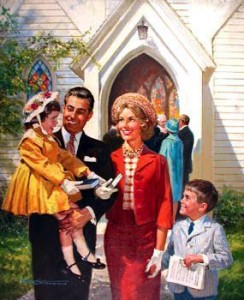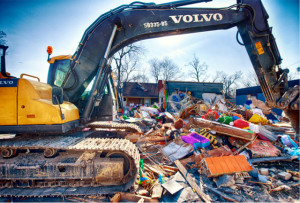Recently, I badmouthed those liberal celebrities who blame themselves for the rise of Donald Trump. Of course, our titans of the entertainment industry have bigger problems to face, like opening the correct envelope, so I’ll leave them alone.
Instead, I’m going to focus on progressives in general — be they famous, infamous or completely unknown — by pointing out a disturbing trend that has emerged since November. This is the tendency of leftists to absolve conservatives of all responsibility for Trump’s election. Even weirder, my fellow progressives are saying it is our entire fault that America has a cackling xenophobe in the White House.
Indeed, many good leftists are bowing their heads and admitting that it is the most malignant of monsters — political correctness — that explains, “more than anything, how the left created Trump.”
Progressives are shouting that the left abandoned the white working class, and that liberal elitism pushed rural voters away, and that liberals became bullies and gave conservatives no choice (no choice at all!) but to embrace Trump.
All this strikes some other liberals as whiny and self-indulgent. But I disagree.
I believe that it is the political equivalent of spousal abuse.
It’s clear that some liberals have been punched, degraded, and insulted by conservatives for so long that many progressives now accept the horrible image that right-wingers have created for them.
Just like in cases of spousal abuse, liberals are justifying the repulsive behavior of many conservatives, releasing them from blame, admitting the ill treatment is deserved, and then lining up for more.
Let me be clear. I am not making light of the issue of domestic violence. Some of my friends and family have suffered through this agony, so I don’t employ this metaphor lightly.
But it is eerie how so many progressives, no matter how much they are slurred and ridiculed, turn around and say that we had Trump coming, just be virtue of being liberal.
Remember, right-wingers never blamed themselves for Obama. Hell, they shrieked that liberals were idiots who had destroyed America by voting for a Kenyan socialist who was going to take away all their guns. Obama’s election only increased conservatives’ disdain for progressives, and it lead to zero self-loathing or reflection on the part of conservatives.
So why are liberals prone to accepting blame for the actions of conservatives, even clamoring for it at times?
Well, there are many reasons for this.
First, liberals tend to be nicey-nicey and avoid hurting anyone’s feelings (that conservative chestnut has a grain of truth to it). And in this case, progressives don’t want to get all mean and point out that many Trump supporters are straight-up misogynists and racists.
So progressives imply that Trump supporters are merely misunderstood, and that if we just charm red-state America enough, these people will forget all about their hatred of gay marriage and fear of Latinos.
It’s just that easy. Yup.
Of course, we would have to ignore statistics like this one: “A whopping 39 percent of Trump voters believe that women who get abortions should face legal punishment, an opinion that is otherwise so unpopular that even the anti-choice movement disavows it.”
But of course, they can’t be criticized for that loathsome viewpoint. It’s all the liberals’ fault.
Far too many leftists are saying we must reach out and plead with Trump supporters, who in turn don’t have to change at all. It is the progressives who must alter their worldview. This is despite the fact that Trump lost the popular vote (overwhelmingly) and has one of the worst approval ratings for a president this early in his administration. No, let us — the progressives — drop all our principles and try to understand the fury of a small group of conservatives, even as they deride us as dim-witted, latte-sipping wimps.
This brings up another point, which is that liberals are insulted routinely, and yet, we have not used this as a pathetic excuse to “blow up the system” or whatever euphemism the right wing is using to endanger democracy.
“But wait,” the bruised and battered liberal says. “We made them hate us, because Hollywood skewers them mercilessly in popular culture.”
Hey, here’s an interesting statistic for you. Latinos are the most underrepresented group in popular culture, and when we are shown, it is usually in stereotypical or highly negative ways.
No, the white working class has no idea what it’s like to be mocked.
But let’s accept the argument that the entertainment industry — and by bizarre extension, all of liberal culture — has been vicious to conservatives. Well, liberals don’t say, “suck it up, snowflake,” because that would be, you know, not nice.
Instead, the self-loathing liberal says that this is perfectly reasonable grounds for embracing demagoguery.
Think about that.
We’re basically saying it’s ok to get annoyed that, for example, many black people prefer the term “African American.” And not just peeved, as when one rolls his eyes, dismisses something as silly, and then goes about his business.
No, we agree that the logical reaction is to fly into an eye-popping rage and vote for a narcissistic nutjob. How in the world does A follow B? Why is becoming furious at the idea of women getting equal pay somehow acceptable, and even more so, a solid rationale for voting for an unqualified man-child who is cozy with dictators?
But progressives ignore these reddest of red flags, and they simply say, “Hey, right-wingers, we apologize for asking you not to slur Asians and refrain from throwing shit at mosques. We don’t know what we were thinking.”
Again, this is the political equivalent of saying, “I’m sorry I made you so angry that you punched me in the face. I’ll go get your beer now.”
As a final example of this twisted tendency, look at how many liberals are falling over themselves to proclaim Trump “presidential” now that he has successfully delivered one insult-free, semi-coherent speech. This most meager of accomplishments has convinced many progressives that Trump is a changed man, and will do the right thing, and will be the president for all of us.
And he bought me flowers and didn’t hit me on my birthday and he’s a changed man it’s different now don’t you see he really loves me and it will be better now and…
And…
And…












